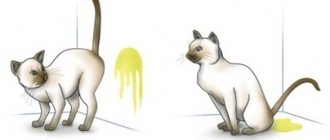15118Administration
1
Many people do not want to have cats because of their tendency to mark all vertical objects in an apartment or house, so the choice often falls on cats. Male felines do this quite regularly, especially after puberty. However, it is difficult to answer unequivocally whether cats mark territory like cats.
In most cases, the owner simply confuses banal urination with a mark. Cats sit down to go to the toilet. When marking objects, they stand with their backs to the surface and raise their tail, releasing a few drops of liquid.
When concerns are confirmed, it is important to know what to do if your cat is marking its territory. The process of castration and sterilization is very stressful for animals and this procedure does not always help.
The main reason for marking is a change of environment, heat, a new family member or animal. The cat reacts to stimuli instinctively, so you should not shout at it. Radical actions generally only make things worse.
Why is this happening
Leaving special marks should not be confused with normal urination. If in the second case the animal relieves itself naturally in a specially designated place (tray), then marking the territory is a special ritual with the help of which the fluffy wants to say that he is the owner here. As a rule, purrs choose any furniture, walls, interior or entrance door, flower pots, etc. for this purpose. Animals living outside leave “marks” on tree trunks, bushes, plants, and fences. Do not rush to scold a cat for bad behavior; he is guided by instincts, genetics and a self-preservation mechanism.
Representatives of the feline genus have an excellent sense of smell; the odors left behind serve as a clear, readable identifier of the individual. But it’s one thing when a cat marks territory, what if a cat does it? This also happens, although much less frequently; the female also leaves her “calling cards”, marking the boundaries of her zone, declaring who is in charge in the house. Animals, being under stress, strive to protect themselves from outside encroachment and imaginary enemies.
Causes
The surprise that a castrated animal continues to mark its territory is quite justified. But everything has its own reasons, after studying which, the fact that the cat’s disgrace continues after the operation will no longer seem so illogical:
- Cryptorchidism. This is a deviation when for some reason one testicle does not descend into the scrotum and remains in the cat’s abdominal cavity. Thus, during castration it was not affected and, as a result, the sexual development of the cryptorchid pet did not stop (the marks, accordingly, continue and will appear until a repeat - already abdominal - operation). This option is possible due to the doctor’s inexperience or error.
- Fight for territory. If a pet marks for the sake of “appropriating” territory and objects even after castration, this may be due to the presence of other animals in the same apartment, mainly also of the cat breed. Here there is already a struggle for leadership and for possessions, which the cat cannot refuse by nature, despite castration. It is unlikely that it will be possible to wean the animal from marking; you just need to wait for some time until the hormonal storms calm down after the operation.
- Castration at puberty. Ideally, a cat should be neutered between the ages of 8 months and one year. But if the pet has become “sterile” after having experienced all the delights of the notorious month of March, you should not expect the marks to immediately disappear immediately after castration. It can take from 1 to 6 months (everyone is different) until the hormonal levels return to normal. Again, nothing can be done here, all that remains is to wait patiently and diligently wash the apartment and things from the cat’s amber. But if six months have passed and the situation has not changed, the neutered pet needs to be shown to a veterinarian and examined for hormonal disorders.
- Stress, depression. Cats do not like global changes; stability is very important for them. Therefore, any major changes in their lives can lead to a stressful state (the appearance of a new family member, moving to another place of residence, etc.). The cause of depression can also be the lack of human love for the cat in your care and loneliness. In such cases, marks can be considered as a way for a neutered cat to attract attention to himself.
- A little time passed after castration. After surgery, cats can still continue to mark for 3 or even 4 weeks, and this is not a pathology. The hormonal levels do not normalize overnight; this may take about 1 month, and during this time the neutered pet will continue to persistently mark, no matter how dissatisfied the owners may be.
- Diseases. With many diseases of the urethra (urticaria, cystitis, etc.), the animal experiences pain when visiting the litter box. The result of this may be behavioral failures, and then the neutered fluffy continues to mark. In such cases, the pet associates the tray with pain, and the cat deliberately begins to “spray” anywhere (corner, wall, master’s bed, etc.) in the hope that it won’t hurt there. But if the reason lies in the disease, you need to take a closer look to see if there are other signs - lethargy, poor appetite, nervousness when going to the toilet, etc. If there are any, the neutered pet should be shown to a doctor.
- Dirty tray. The carelessness of the owners does not oblige the cats to respond to them with cleanliness, and this can also be the reason that a neutered pet continues to mark. An uncleaned cat litter box is unpleasant for its main visitor, and the marks that appear in the house as a result are a kind of demonstration of the cat’s “fi” towards the owner’s sloppiness.
shutterstock
Now that the main reasons are more or less clear and the pet’s innocence has been proven, it’s time to figure out what to do if neutered cats continue to mark their territory.
When do the first cat marks appear?
For the first time, owners are faced with the problem of how to wean a cat from marking territory in the house after six months, by which time the fluffies become sexually mature. The onset of this period depends on the breed:
- large individuals (ragdoll, maine coon) - closer to 12 months;
- British - by 8 months;
- Siamese - by 5-6 months.
Personality, genetic predisposition, home environment, the presence of other pets and other factors matter. In some cases, you may be lucky and the question of how to wean a cat from marking will not become relevant. If the animal has a calm character, puberty occurs without incident, you may not see any odorous traces on interior items, doors or walls.
Why doesn't castration or sterilization always solve the problem?
Sometimes a neutered cat marks its territory even after a long time after surgery. It continues to do this if:
- was castrated in old age and leaving marks became his habit;
- has such a feature as cryptorchidism, when one or both testicles are located not in the scrotum, as it should be normally, but in the groin area or abdominal cavity, and during the operation an inexperienced surgeon did not take this point into account;
- there are other relatives in the home - a castrated animal still has to protect its personal boundaries.
How often do cats leave marks?
Here everything is individual, if females mark only during estrus, males can dirty the apartment all year round (usually in spring and autumn), causing significant inconvenience and discomfort to the owners.
On average, the frequency of leaving urine marks is about 2-3 per day, and “quiet periods” may be observed. But, unfortunately, it also happens that a purr marks at least 10 times in just one day. Here you need to decide what to do to prevent the cat from marking immediately.
Is it all because of heat?
Upon reaching the age of 6 - 8 months, hormones begin to rage. The reproductive instinct awakens and the search for a partner begins.
If an uncastrated cat lives nearby or in the neighborhood, then the cat will try to attract his attention as much as possible with the help of loud screams and marks.
During heat, it is necessary to protect her as much as possible from potential meetings with suitors.
The most common cases are when a cat shits during heat, but the following may also be the cause:
Fluffy marks things and shoes with urine
What should you do if your cat marks everywhere, including shoes and even clothes? Surely you were not prepared for such a development of events when you got a pet.
The fact is that the imperious purr does not care where his scent marks will be; the main goal is to inform competitors and surrounding people that there is no place for a stranger in this territory. As for shoes, they exude the aroma of human body and sweat. The animal will try in every way to drown out extraneous odors, replacing the aromatic bouquet of shoes that is unacceptable to it with urine marks.
Why do cats ignore the litter box during heat?
As noted earlier, a cat during estrus often shits anywhere. Ignoring the tray during sexual heat is due to the fact that she is trying to attract a partner for mating with the help of her smell.
During the period of heat, pets that roam freely on the street often disappear from home for some time. If a cat is unable to find a sexual partner outside the home, it leaves scent marks everywhere. This is a kind of signal that the cat is ready for mating and subsequent procreation. This behavior is typical not only for pets who have not undergone castration and sterilization, but also for sterilized females whose ovaries are preserved, hormones are produced and, accordingly, sexual attraction to males arises.
Animal marks a person
In certain cases, formed behavioral instincts force the cat to urinate on the owner. In this way, the purr declares its rights, making you a member of the imaginary cat clan. On the one hand, you should be proud that you are accepted as one of their own, on the other hand, this is unacceptable and everything must be done to stop the cat from marking the apartment and you.
It also happens that a cat perceives its owner as a competitor; this is especially typical for animals that were picked up on the street at puberty. Fuzzies, obeying natural instinct, continue to fight for themselves, mistaking you for a competitor.
Raising an adult cat
Castration may not provide a complete solution to the problem, so it is worth starting to raise your pet. The owner must secure his position. This can be done in the same way as in the case of a young pet, but there are other options. After cleaning, you can start leaving your marks - this does not mean that you should spray your urine around the apartment (however, some repeated this procedure, and it turned out to be effective).
This is how the cat tries to cover up the owner's scent.
It is necessary to make sure that the owner's scent interrupts the cat's marks. To do this, you can leave clothes that smell of sweat near the marks. You will have to wear socks for about a day or some piece of fabric in the armpit for about an hour.
Where do cats mark most often?
Despite the strong, unpleasant aroma of cat urine, it is not easy to find the specific place where the little villain urinated. Typically, the crime scene is walls, cabinet fronts, furniture, a refrigerator, wallpaper, the owner’s clothes or shoes, or another pet’s sleeping place.
Some fluffies choose unusual, hard-to-reach places that a good sense of smell is not enough to identify. A UV lamp or flashlight with LED beams will help in the search; traces of urine are highlighted with a bright yellowish-neon spot.
Create an imitation feline friend
The toy girlfriend method works temporarily, freeing the cat’s genitals from exhausting pressure. For these purposes, you can use an unnecessary soft toy.
A small pillow that the cat will bite and trample on like a cat is also perfect. Cats love natural fur. If you give your pet a piece of skin with fur, there is a high probability that it will replace his female.
To attract your pet's attention, you can sprinkle the toy with catnip.
Despite the variety of methods and tips, not a single method provides a complete guarantee. Sometimes a cat has the character of an alpha male, in this case nothing will help except timely castration. In other cases, it is quite possible to wean an animal from marking if you follow all the above recommendations.
Prevention or how to stop a cat from marking in the house in advance
Uncastrated animals begin their “dirty deeds” no earlier than six months of age; until this period, living together with a kitten will not cause inconvenience. Problems begin after reaching sexual maturity, at which time the male’s leadership qualities begin to appear. Unfortunately, it is not possible to prevent the development of natural changes in the body.
At the same time, it is necessary to pay attention to the education of the animal:
- show your child who is boss in the house, do not allow permissiveness;
- pay attention to the fluffy, do not leave him alone for a long time;
- Make sure your cat has toys and play with him.
Do not use force against the cat under any circumstances, do not show aggression, do not throw objects at it, do not raise your voice. Harsh parenting methods will provoke an aggressive reaction, the purr will mark more diligently, thereby trying to protect itself. The only effective preventive measure is competent education and timely hygiene measures.
Weaning a young pet from tagging
After purchasing a kitten, you need to understand that from the age of six months it can begin to mark. Because of this, it is necessary to know in advance how to deal with this problem before it occurs. If it is extremely difficult to wean an adult pet without surgery, then a kitten can be dealt with without castration.
If the cat begins to mark the territory, it is necessary to be strict and show who is the owner of the room. Kittens are very susceptible to roughness and can easily be left psychologically traumatized by mishandling.
If you don’t do much with the kitten and don’t show interest or attention to it, it may start putting marks on its owner’s bed and things. You can correct the situation with games, affection and care.
What to do if your cat marks
The peak of “activity” occurs in the autumn-autumn period, this is explained by hormonal changes in the cat’s body. Zoologists associate the strengthening of sexual instincts with an increase in the duration of daylight hours, as well as the peculiarities of the biological rhythm of the animal.
In search of an answer to the question of what to do to prevent a cat from marking, owners are trying non-standard solutions. One of these can be called keeping an animal during an “exacerbation” in a darkened room. If the “irreparable” has already happened, it is necessary to clean the stained area, thoroughly wash the furniture and walls, apply a disinfectant and repellent spray.
Veterinarians do not recommend using detergents containing bleach; bleach vapors are dangerous for people and animals. Regular baking soda, a weak solution of vinegar, or special products that neutralize the pungent odor of urine will do.
At worst, if you don’t have a special spray on hand, you can use aromatic oils, eau de toilette, incense sticks, perfume or air freshener.
Duration and frequency of sexual heat
Characteristic behavior lasts from 3 to 10 days. The period when a cat is in sexual heat and allows a cat to approach her is called estrus. At this time, the ovarian follicles produce the maximum amount of estrogens and sex hormones.
In the very first days of estrus (1-4 days), the cat demonstrates sexual arousal, but does not allow mating. This time is called proestrus, “forerunner”. Unlike dogs, cats do not have a clear boundary between estrus and proestrus, and it is difficult to determine these periods.
If sexual intercourse does not occur during estrus, then ovulation does not occur. In this case, sexual heat returns every 10-14 days. The period between estrus is called interestrus, this is a time of rest for the uterus and ovaries. In some cats, the concentration of estrogen in the blood does not decrease, and the animal walks constantly.
Prolonged heat is a sign of follicular ovarian cysts, which must be removed surgically.
Complete rest of the ovaries, which means the absence of the reproductive instinct, is called anestrus, the absence of estrus. In stray cats, this period occurs in late autumn or winter, due to short daylight hours and the action of the hormone melatonin. Anestrus does not occur in domestic cats due to constant light and nutritious food.
A distinctive feature of the breeding system in cats is induced ovulation. Simply put, an egg is released from the ovary only in response to vaginal stimulation. Natural ovulation occurs due to mating, but artificial ovulation is also possible - as a result of manipulations in the vagina.
Ovulation occurs 1-2 days after intercourse, and after another 1-2 days the estrus stops. The ovary forms the corpus luteum, which produces the hormone progesterone to maintain pregnancy.
If the egg is released and fertilization does not occur, progesterone will be produced “by inertia” for 1-1.5 months (less than a true pregnancy). Progesterone prevents the resumption of estrus.
We suggest you read: Large breeds of pigs - choice for breeding
In cats, sexual function does not decline until death; even at 16-19 years of age, estrus is observed from time to time in non-sterilized animals.
I'm 14 years old, motherfucker, how old can you be?
How to remove traces of urine in an apartment
Even when you have decided what to do to prevent the cat from marking the house, you need to be prepared that the chosen measures may not give immediate results. Be patient, remember that the cat does nothing to spite you, he is guided by natural instincts that cannot be resisted.
List of what you will need in the fight for cleanliness in the house:
- detergents;
- sprays and liquids for cleaning carpets;
- odor neutralizers that wean the animal off marks.
Of course, you can use more affordable means - vinegar solution, hydrogen peroxide, citric acid, but their effectiveness is much lower, and besides, you risk ruining the upholstery of an expensive sofa.
Territory designation
At the age of 6-8 months, cats reach puberty, and the reproductive instinct makes itself felt with characteristic signs: loud meowing and guttural screams, changes in behavior (excessive affection or aggressiveness), as well as marking of territory. Urine is used by animals as a way to attract a mate and let him know that they are willing to mate.
The soiling of furniture, curtains, clothes, the owner's slippers and other household items indicates that sexual hunting has begun. By means of secreted pheromones, females notify males that they are ready to reproduce, and males scare away other cats, letting them know that entry into someone else’s territory is prohibited. The marking process goes like this: the animal approaches a vertical surface (wall, door, furniture) with its back, raises its tail and leaves stinking marks on the surface with stunning movements.
It is useless to go against nature, so no educational measures or persuasion will help to reason with the cat so that he does not pee anywhere. In such a situation, three options are possible:
- Realize natural instinct and mate animals. It makes sense when there is an opportunity to place the kittens in good hands in the future or sell them if the parents are purebred. It is worth considering that frequent mating undermines the health of cats, and cats only temporarily stop marking the apartment.
- Castration/sterilization. A surgical solution to the problem is a fairly common method of contraception. The operation involves the removal of the gonads and, as a result, the animal’s sexual activity is suppressed or completely stopped. It is performed under general anesthesia in a veterinary clinic. After surgery, you will no longer need to try to wean your cat from peeing in the wrong place - they lose interest in the opposite sex, become obedient, affectionate and do not mark in the house.
- Taking hormonal drugs. There are many pros and cons for this method, so the decision to use oral contraceptives is made individually by the cat owner. Sterilization surgery may be contraindicated due to the animal’s advanced age, various injuries and health problems.
Important: it should be borne in mind that hormonal drugs can cause the development of mastopathy and malignant tumors. As an alternative, veterinarians suggest bio-sterilization, that is, a one-time injection of hormones into the cat’s body.
The procedure lasts for 9-12 months, and then it is repeated again.
What to do to prevent a cat from marking - use folk remedies
As you know, folk “proven” methods exist in solving any issue; weaning a cat from a bad habit is no exception. Some owners use the scent of citrus to influence their pet's behavior; for others, the most common laundry soap helps.
Try treating the cat's favorite places with ammonia, put wormwood or a bag of aromatic spices there, turmeric, mustard powder, red and black pepper will do. Fluffies do not like substances that emit a pungent odor, so with a high degree of probability, they will avoid this place, or simply find a new one, depending on their luck.
What is a territory marker and why is it needed?
Cats begin to mark their territory regardless of the cleanliness of the litter box or the desire to go to the toilet. The marking process itself is different from urination, where the pet sits down slightly to do its job. The cat marks its territory as follows:
- the pet approaches the selected place backwards;
- raises the tail and vibrates it sharply;
- emits a stream that has a very pungent odor.
Usually the cat marks clothes and shoes, which is why you often have to throw things away, since it is extremely difficult to remove the smell. Equally common is the marking of vertical objects, such as furniture and doors.
The composition of the liquid released to mark the territory differs from regular urine. It contains uric acid crystals, which give such an unpleasant odor. The aroma becomes stronger if the animal marks the same place repeatedly.
© shutterstock
We correct the cat's behavior with special means
Cats often cause mischief in the house due to an unstable emotional state, which can be caused by moving, the appearance of a new pet, frequent quarrels, the birth of a child, and other factors. In this case, you need to help the cat survive stress with the help of sedatives.
It is advisable to choose plant-based homeopathic remedies that do not have a sedative effect. Regarding the use of hormonal contraceptives, their effectiveness has not been proven in the fight against feline marking in the home.
The cat is scared
This also happens. In this case, the animal begins to leave marks not because it wants to make itself known. He’s just extremely uncomfortable, and having staked out the territory, the cat feels some relief. Now my home is my fortress. Fright can be triggered by a long absence of a beloved owner or moving to a new place of residence, illness and its treatment with intramuscular injections.
To exclude this reason, you need to understand what the animal is afraid of. It's not that difficult if you spend enough time with your pet. Feeling your love and care, the pet will understand that it is under reliable protection.
How to stop a cat from marking the door
Quite often, purrs begin to mark their territory immediately upon entering the house, that is, they leave drops of urine on the front door. To discourage your pet from damaging the door leaf, thoroughly wash the surface, remove the unpleasant odor, and apply a product with a cat-repellent scent.
Additionally, you can scatter strong-smelling spices near the mat, put a slice of lemon, or leave a cotton swab dipped in ammonia.
Cat owners share their experiences
All cat owners who have extensive experience communicating with their pets unanimously say: cats should be raised from the first day of their appearance in the house. Lack of attention to a furry friend is simply unacceptable - the kitten does not develop, withdraws into itself and becomes a hermit. The educational process best takes place in a playful way. You need to talk to your baby in the same way as you would to a small child. Fluffy feels the attitude of his owners very well and tries to repay their love with gratitude. At the onset of puberty, most cat owners recommend castration. It is believed that this is better than hormonal effects. The main advantage: castration has much less impact on the cat’s health.
No drugs can suppress the innate reflex of a cat to leave marks on its territory. The most effective preventive measure is timely castration of the cat. It is better to perform such an operation at the age of 8–10 months. If castration is done later, the animal will already get used to making marks, and the operation will not help solve this problem. Then it is necessary to act more harshly and seriously. You will have to prove that you are the owner of the house, and not the cat!
Natalia Safonova
https://vk.com/topic-30326501_27550072
Since castration is definitely out of the question, there is another option, but it’s complicated and not completely guaranteed. You need to build a hierarchy with the cat, that is, become Glavkot for him. To do this, you need to hiss at the cat for every reason (you can’t do it without a reason), “beat it” (or rather, lightly touch its face) with a “clawed paw” (fingers, while holding your palm like a paw), while doing this, splash a little water on the face . Usually cats choose certain places for marks; access to these places must be blocked. Wash them with vinegar, add tangerine (or orange) peels. There is no guarantee, but before castration we had methyl very rarely. So, we survived the cold until castration. Search the Internet about establishing a hierarchy in a cat pack (you are still a member of the pack, and you need to find a place for yourself in it). It's difficult, it may not work out, but it's still a chance.
Tk1, Izhevsk
https://www.zoovet.ru/forum/?tid=18&tem=276303
In a cat family living in the wild, not all cats in the family mark. Cats strictly follow the family hierarchy, so only the Glavkot of the family has the right to tags. Marking by “younger” cats is a rebellion, an attempt to take the place of the “elder”. Thus, in order for the cat to stop marking, he needs to prove that the main cat here is not he at all, but you (and accordingly, you will now mark the territory yourself).
KissaKissa
https://forum.sestrenka.ru/index.php?showtopic=3198
In general, each owner has his own tactics, developed from his own experience. Much also depends on the character of the animal, because each cat has its own unique behavior pattern.
What to do if other people's cats are marking your territory
If your local area is regularly attacked by yard cats, each of whom considers it their duty to mark it, you can install an ultrasonic repeller near the house.
A special device produces sounds that are harmless to humans and animals and repel uninvited guests. Please note that this solution is suitable for those who do not have their own pets, otherwise your cat will also experience discomfort.
If the cat marks the territory near the house
You already know what to do when a cat marks in the apartment, it’s time to figure out what to do with a pest that regularly does “dirty things” on the street.
The solution should be comprehensive, try to redirect the pet’s attention, use a standard set of repellents.
For distraction you can:
- install a gaming complex;
- buy a new toy;
- use veterinary drugs to correct behavior.
Organizing a place to relieve yourself outdoors can also help. If you need to use a special tray for your home, you can organize a sandy mound in the fresh air, planting aromatic grass around it that is attractive to cats.
What to do?
The best option is castration. It is advisable to have the surgery before puberty occurs. Many owners are afraid of how such a procedure will later affect the animal’s well-being. In fact, this is a common operation, for which it is enough to choose a good specialist.
© shutterstock
If cats shit in the entrance
If the marks left in the apartment cause inconvenience only to the owners, an unpleasant smell in the front door is a collective problem, affecting all residents. To eradicate the problem, it is necessary to castrate all males who live in nearby areas.
The solution will kill several birds with one stone - you will prevent the growth of the population of stray animals, solve the issue of unpleasant odor, and get rid of cats meowing under the windows. Install a door with a locking lock at the entrance to prevent uninvited guests from entering. Otherwise, the solution is standard - thorough cleaning, treating surfaces with repellents and sprays to neutralize odors.











